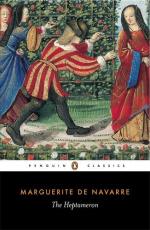2 Although Queen Margaret ascribes the foregoing adventure to one of the officers of her husband’s household, and declares that the narrative is quite true, the same subject had been dealt with by most of the old story-tellers prior to her time, and Deslongchamps points out the same incidents even in the early Hindoo fables (see the Pantcha Tantra, book I., fable vi.). A similar tale is to be found in the Gesta Romanorum (cap. cxxii.), in the fabliaux collected by Legrand d’Aussy (vol. iv., “De la mauvaise femme"), in P. Alphonse’s Disciplina Clericalis (fab. vii.), in the Decameron (day vii., story vi.), and in the Cent Nouvelles Nouvelles (story xvi.). Imitations are also to be found in Bandello (part i., story xxiii.), Malespini (story xliv.), Sansovino (Cento Novelle), Sabadino (Novelle), Etienne (Apologiepour Herodote, ch. xv. ), De la Monnoye (vol. ii.), D’Ouville (Contes, vol. ii.), &c.—L. & B. J.
“By this tale, ladies, you may see how quick and crafty a woman is in escaping from danger. And if her wit be quick to discover the means of concealing a bad deed, it would, in my belief, be yet more subtle in avoiding evil or in doing good; for I have always heard it said that wit to do well is ever the stronger.”
“You may talk of your cunning as much as you please,” said Hircan, “but my opinion is that had the same fortune befallen you, you could not have concealed the truth.”
“I had as lief you deemed me the most foolish woman on earth,” she replied.
“I do not say that,” answered Hircan, “but I think you more likely to be confounded by slander than to devise some cunning means to silence it.”
“You think,” said Nomerfide, “that every one is like you, who would use one slander for the patching of another; but there is danger lest the patch impair what it patches and the foundation be so overladen that all be destroyed. However, if you think that the subtlety, of which all believe you to be fully possessed, is greater than that found in women, I yield place to you to tell the seventh story; and, if you bring yourself forward as the hero, I doubt not that we shall hear wickedness enough.”
“I am not here,” replied Hircan, “to make myself out worse than I am; there are some who do that rather more than is to my liking.”
So saying he looked at his wife, who quickly said—
“Do not fear to tell the truth on my account. I can more easily bear to hear you relate your crafty tricks than to see them played before my eyes, though none of them could lessen the love I bear you.”
“For that reason,” replied Hircan, “I make no complaint of all the false opinions you have had of me. And so, since we understand each other, there will be more security for the future. Yet I am not so foolish as to relate a story of myself, the truth of which might be vexatious to you. I will tell you one of a gentleman who was among my dearest friends.”




